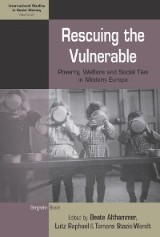Details

Rescuing the Vulnerable
Poverty, Welfare and Social Ties in Modern EuropeInternational Studies in Social History, Band 27 1. Aufl.
|
44,99 € |
|
| Verlag: | Berghahn Books |
| Format: | EPUB |
| Veröffentl.: | 01.05.2016 |
| ISBN/EAN: | 9781785331374 |
| Sprache: | englisch |
| Anzahl Seiten: | 438 |
DRM-geschütztes eBook, Sie benötigen z.B. Adobe Digital Editions und eine Adobe ID zum Lesen.
Beschreibungen
<p> In many ways, the European welfare state constituted a response to the new forms of social fracture and economic turbulence that were born out of industrialization—challenges that were particularly acute for groups whose integration into society seemed the most tenuous. Covering a range of national cases, this volume explores the relationship of weak social ties to poverty and how ideas about this relationship informed welfare policies in the nineteenth and twentieth centuries. By focusing on three representative populations—neglected children, the homeless, and the unemployed—it provides a rich, comparative consideration of the shifting perceptions, representations, and lived experiences of social vulnerability in modern Europe.</p>
<p> Illustrations<br> Figures and Tables</p>
<p> <a><strong>Introduction:</strong> Poverty and Endangered Social Ties: An Introduction</a><br> <em>Beate Althammer and Tamara Stazic-Wendt</em></p>
<p> <strong>Chapter 1.</strong> Poverty and Social Bonds: Towards a Theory of Attachment Regimes<br> <em>Serge Paugam</em></p>
<p> <strong>PART I: ENDANGERED CHILDHOODS</strong></p>
<p> <strong>Chapter 2.</strong> Living at the Edge of Society: Wallchian Orphans in Nineteenth-Century Bucharest<br> <em>Nicoleta Roman</em></p>
<p> <strong>Chapter 3.</strong> Orphans, Pauper Children or Wayward Children? The Lives of Children Cared for by Public Institutons in Hamburg, 1892-1914<br> <em>Katharina Brandes</em></p>
<p> <strong>Chapter 4.</strong> The Reduction of Poverty Starts with Children: Swiss Societies for Educating the Poor in the Nineteenth and Twentieth Centuries<br> <em>Ernst Guggisberg</em></p>
<p> <strong>Chapter 5.</strong> Compassion for the Distant Other: Children's Hunger and Humanitarian Relief in the Aftermath of the Great War<br> <em>Frederike Kind-Kovács</em></p>
<p> <strong>PART II: VAGRANCY AND HOMELESSNESS</strong></p>
<p> <strong>Chapter 6.</strong> Traditional Mobility and Solidarity in Crisis: Jeremias Gotthelf's Response to Pauperism in the <em>Vormärz</em><br> <em>Andrew Cusack</em></p>
<p> <strong>Chapter 7.</strong> Controlling Vagrancy: Germany, England and France, 1880-1914<br> <em>Beate Althammer</em></p>
<p> <strong>Chapter 8.</strong> The Prolbem of Homelessness in Postwar Britain<br> <em>Tehila Sasson</em></p>
<p> <strong>PART III: UNEMPLOYMENT</strong></p>
<p> <strong>Chapter 9.</strong> 'United Idle Men with Idle Land': The Evolution of the Hollesley Bay Training Farm Experiment for the London Unemployed, 1905-1908<br> <em>Elizabeth A. Scott</em></p>
<p> <strong>Chapter 10.</strong> An Unbearable Social Existence: The Unemployed in Rural Poor Relief (Germany, 1918-1933)<br> <em>Tamara Stazic-Wendt</em></p>
<p> <strong>Chapter 11.</strong> How Unemployment was Normalized by the Establishment of Public Labour Exchanges in Austria, 1918-1938<br> <em>Irina Vana</em></p>
<p> <strong>Chapter 12.</strong> The Poor Unemployed: Diagnoses of Unemployment in Britain and West Germany in the 1970s and 1980s<br> <em>Wiebke Wiede</em></p>
<p> <strong>PART IV: RE-ESTABLISHING SOCIAL TIES: NARRATIVES AND APPEALS FROM THE POOR</strong></p>
<p> <strong>Chapter 13.</strong> Voices from the Lower Depths: Russian Poor in Their Own Words<br> <em>Hubertus Jahn</em></p>
<p> <strong>Chapter 14.</strong> 'They Sit for Days and Have Only Their Sorrow to Eat': Old Age Poverty in German and British Pauper Narratives<br> <em>Andreas Gestrich and Daniela Heinisch</em></p>
<p> <strong>Chapter 15.</strong> Seen With Their Own Eyes: Self-Presentation of the Poor in Freiburg and Schwerin, 1950-1975<br> <em>Dorothee Lürbke</em></p>
<p> <strong>Conclusion:</strong> The Twisted Paths of Recognition and Protection: Vulnerability and Welfare in European Societies<br> <em>Lutz Raphael</em></p>
<p> Bibliography<br> Index</p>
<p> <a><strong>Introduction:</strong> Poverty and Endangered Social Ties: An Introduction</a><br> <em>Beate Althammer and Tamara Stazic-Wendt</em></p>
<p> <strong>Chapter 1.</strong> Poverty and Social Bonds: Towards a Theory of Attachment Regimes<br> <em>Serge Paugam</em></p>
<p> <strong>PART I: ENDANGERED CHILDHOODS</strong></p>
<p> <strong>Chapter 2.</strong> Living at the Edge of Society: Wallchian Orphans in Nineteenth-Century Bucharest<br> <em>Nicoleta Roman</em></p>
<p> <strong>Chapter 3.</strong> Orphans, Pauper Children or Wayward Children? The Lives of Children Cared for by Public Institutons in Hamburg, 1892-1914<br> <em>Katharina Brandes</em></p>
<p> <strong>Chapter 4.</strong> The Reduction of Poverty Starts with Children: Swiss Societies for Educating the Poor in the Nineteenth and Twentieth Centuries<br> <em>Ernst Guggisberg</em></p>
<p> <strong>Chapter 5.</strong> Compassion for the Distant Other: Children's Hunger and Humanitarian Relief in the Aftermath of the Great War<br> <em>Frederike Kind-Kovács</em></p>
<p> <strong>PART II: VAGRANCY AND HOMELESSNESS</strong></p>
<p> <strong>Chapter 6.</strong> Traditional Mobility and Solidarity in Crisis: Jeremias Gotthelf's Response to Pauperism in the <em>Vormärz</em><br> <em>Andrew Cusack</em></p>
<p> <strong>Chapter 7.</strong> Controlling Vagrancy: Germany, England and France, 1880-1914<br> <em>Beate Althammer</em></p>
<p> <strong>Chapter 8.</strong> The Prolbem of Homelessness in Postwar Britain<br> <em>Tehila Sasson</em></p>
<p> <strong>PART III: UNEMPLOYMENT</strong></p>
<p> <strong>Chapter 9.</strong> 'United Idle Men with Idle Land': The Evolution of the Hollesley Bay Training Farm Experiment for the London Unemployed, 1905-1908<br> <em>Elizabeth A. Scott</em></p>
<p> <strong>Chapter 10.</strong> An Unbearable Social Existence: The Unemployed in Rural Poor Relief (Germany, 1918-1933)<br> <em>Tamara Stazic-Wendt</em></p>
<p> <strong>Chapter 11.</strong> How Unemployment was Normalized by the Establishment of Public Labour Exchanges in Austria, 1918-1938<br> <em>Irina Vana</em></p>
<p> <strong>Chapter 12.</strong> The Poor Unemployed: Diagnoses of Unemployment in Britain and West Germany in the 1970s and 1980s<br> <em>Wiebke Wiede</em></p>
<p> <strong>PART IV: RE-ESTABLISHING SOCIAL TIES: NARRATIVES AND APPEALS FROM THE POOR</strong></p>
<p> <strong>Chapter 13.</strong> Voices from the Lower Depths: Russian Poor in Their Own Words<br> <em>Hubertus Jahn</em></p>
<p> <strong>Chapter 14.</strong> 'They Sit for Days and Have Only Their Sorrow to Eat': Old Age Poverty in German and British Pauper Narratives<br> <em>Andreas Gestrich and Daniela Heinisch</em></p>
<p> <strong>Chapter 15.</strong> Seen With Their Own Eyes: Self-Presentation of the Poor in Freiburg and Schwerin, 1950-1975<br> <em>Dorothee Lürbke</em></p>
<p> <strong>Conclusion:</strong> The Twisted Paths of Recognition and Protection: Vulnerability and Welfare in European Societies<br> <em>Lutz Raphael</em></p>
<p> Bibliography<br> Index</p>
<p> <strong>Lutz Raphael</strong> is Professor of Contemporary History at the University of Trier. His recent books include <em>Imperiale Gewalt und Mobilisierte Nation: Europa 1914-1945</em> (2011) and (together with Altay Coskun) <em>Fremd und rechtlos?: Zugehörigkeitsrechte Fremder von der Antike bis zur Gegenwart. Ein Handbuch</em> (2014).</p>
Diese Produkte könnten Sie auch interessieren:

Políticas de desarrollo, cohesión social e inserción internacional conjunta para la integración latinoamericana

von: Alberto Van Klaveren, Mamadou Alpha Diallo, Clarisa Giaccaglia, Carla Morasso, Regiane Nitsch Bressan, Bruno Theodoro Luciano, Cairo Gabriel Borges Junqueira, Virginia Saldaña Ortega, Aparajita Gangopadhyay, Sadcidi Zerpa de Hurtado, Dattesh D. Parulekar, Darynaufal Mulyaman, Jason Rafael Setia Djaya, Muhammad Firdaus Rajendra, Alberto José Hurtado Briceño, Dorotea López Giral

8,49 €















